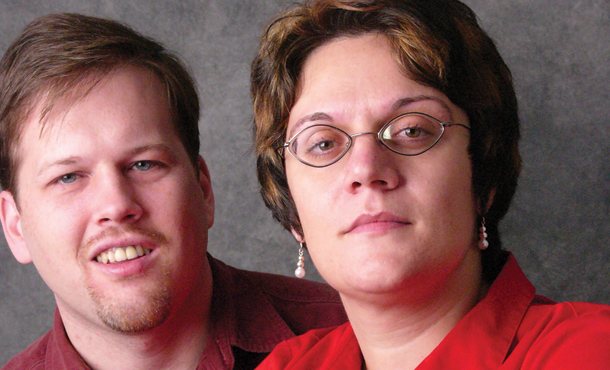Randy Puljek-Shank, MA ’99
Sarajevo, Bosnia-Herzegovina
 Based in Amela’s home country of Bosnia-Herzegovina, Randy and Amela Puljek-Shank have spent the last eight years devoted to healing the harms caused by the horrific warfare that occurred in the early 1990s across what was formerly Yugoslavia, and to preventing such horrors from happening again. They are also jointly devoted to raising their 3-year-old son.
Based in Amela’s home country of Bosnia-Herzegovina, Randy and Amela Puljek-Shank have spent the last eight years devoted to healing the harms caused by the horrific warfare that occurred in the early 1990s across what was formerly Yugoslavia, and to preventing such horrors from happening again. They are also jointly devoted to raising their 3-year-old son.
[Randy and his wife Amela co-lead Mennonite Central Committee (MCC) in southeast Europe, thus their stories are intertwined. Amela is a 2004 graduate.]
As MCC representatives, the Puljek-Shanks foster a network of peacebuilding organizations in southeast Europe, primarily in Croatia, Serbia and Bosnia-Herzogovina. “This involves listening to their needs and helping them assess their situation,” says Randy. “We consult with them about the steps they’ve taken, or envision taking, and the programs they desire.”
Randy and Amela successfully collaborated with the leaders of three other local organizations to start the Peace Academy in Sarajevo three years ago. Modeled on EMU’s Summer Peacebuilding Institute, the academy offers three classes simultaneously for seven days once a year. With 60 participants in the summer of 2010, it reached capacity.
Partnering with the Franciscans, Randy and Amela have established a trauma center in Sarajevo to address the psychological wounds of war, using materials from STAR (Strategies for Trauma Awareness and Resilience). They have lent MCC’s support to summertime youth camps that teach peace. They have stepped over religious fences to work with Bosnian-Muslim instructors to explore the peace aspects of Islam. They have reached out to war veterans from all sides. “These men are older and wiser. They often lost a lot in the wars,” says Randy. “If helped to reflect on their experiences, they can be excellent advocates for peace.”
Perhaps most meaningful of all, once per year Randy and Amela have invited representatives of all 20 organizations with whom they collaborate to come to a “summit.” This event serves to “renew the strength and energy” of all concerned, says Randy. It helps them to realize that they are making a positive impact, despite the seeming slowness of the social changes they would like to see.
